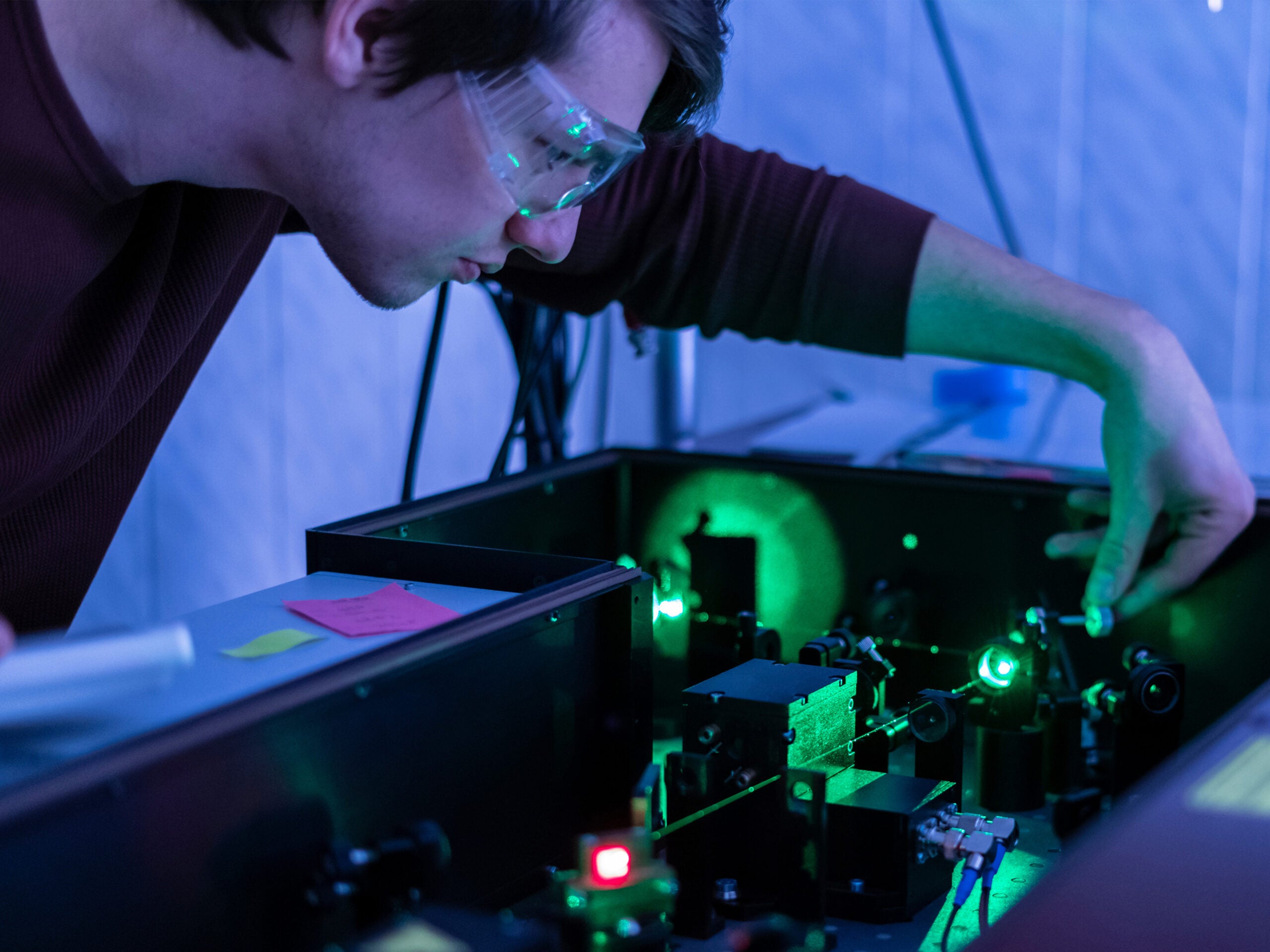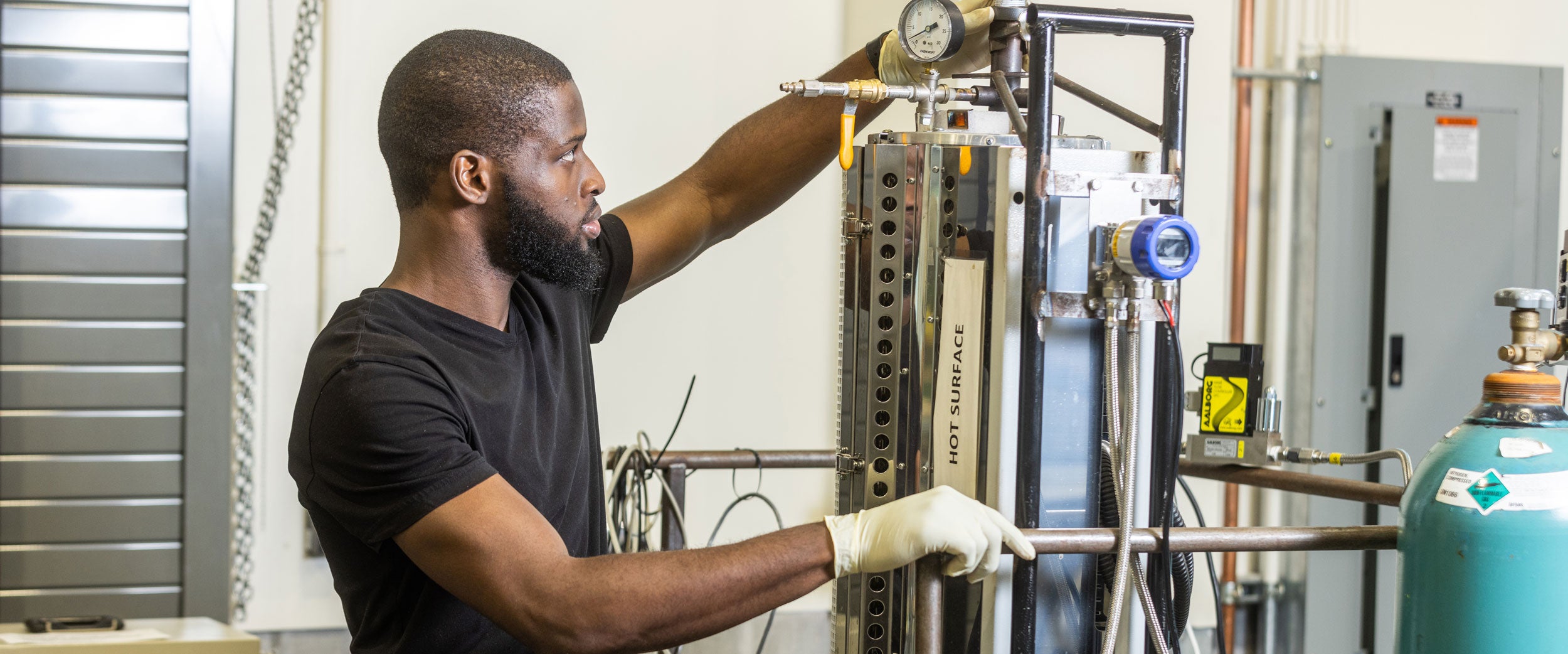Enter a universe-sized field of knowledge as you pursue a physics major and explore the fundamental properties of the material world.
Locations
- Statesboro Campus (In Person)
- Armstrong Campus (In Person)
Why Major in Physics at Georgia Southern?
- Study the very nature of matter, space and time in a highly technical career field.
- Lay the groundwork for an advanced degree in physics or pursue employment as a professional physicist.
- Participate in experimental and theoretical research alongside our world-class faculty.
- Choose between a BS in Physics, a BA with a major in Physics and Astronomy, or a Physics degree as part of our Pre-Med Program.
At Georgia Southern we strive to graduate world-class students who can go on to pioneer ground breaking research in their field. Our physics majors work shoulder to shoulder with top scientists exploring the most intricate and complex facets of the material world from nano-technology to astrophysics, helping to push the bounds of human knowledge farther into the yet undiscovered universe.
Ready to Apply?
What Can You Do With a Degree in Physics?
Given that physics is such a fundamental discipline, a physics degree opens doors to several areas of advanced study—fields as varied as astronomy, quantum information, material science, optics, nanoscience and geophysics. Or, if you’d rather move straight into the professional world, there are opportunities for physics majors in chemistry, biology and medicine.
Where our graduates work:
- Our world-class faculty and state-of-the-art labs prepare physics graduates to excel in a variety of technical roles, from medical physicists to project managers to engineers. Not only that, but our strong industry ties open up opportunities with organizations like Epicypher, Inc. and Northside Hospital.
What our graduates do:
- Software Engineer
- Project Manager
- Engineer
- Chief Executive Officer
- Graduate Research Assistant
- Analyst
- Engineering Manager
- General Manager
- Manufacturing Engineer
- Medical Physicist
What You’ll Learn
As a physics major, you will be given a strong foundation in both physics and astronomy—excellent preparation for an advanced degree, a professional career or a career in science education. Coursework culminates in either a Bachelor of Science in Physics—geared towards advanced study or industry work, or a Bachelor of Arts with a major in Physics and Astronomy—geared towards a career in education.
All students will learn:
- The principles of physics, including concepts in Newtonian mechanics, electricity and magnetism.
- Laboratory and communication skills built around applying and articulating the scientific method.
- The Problem solving and advanced mathematics necessary to perform cutting-edge research and foster a career in learning.
Build Your Experience
Physics majors put their curiosity and skills to work long before they graduate. Get involved with cutting-edge research at the Center for Advanced Materials Science or through our undergraduate research program, or apply to study physics abroad in beautiful Romania.

Get Involved
Meet like minded students by joining the Society of Physics Students, or a Residential Learning Community, or get academic guidance from the COSM Advisement Center.

Minor in Physics
The Physics Minor provides a solid foundation in physics suitable to support degrees in any of the physical sciences and engineering, such as chemistry and geology.
Take Action
Follow these steps to complete the Georgia Southern application:
- Create an application account.
- Complete our online application using the PIN you received after creating your application account.
- Once complete, pay the $30 application fee or upload a valid fee waiver. Previous Georgia Southern applicants and dual-enrollment students do not need to pay the fee.
You can check your application status at My.GeorgiaSouthern.edu/admissions three days after completing your application. This page contains live information about your admission status, including a checklist of missing documents we need to make a decision.
Apply as a First-Year Student Transfer to Georgia SouthernGeorgia Southern University is accredited by the Southern Association of Colleges and Schools Commission on Colleges (SACSCOC) to award associates, baccalaureate, masters, educational specialists and doctorate degrees.
Earn a terminal professional degree and gain real-world experience in applying physical science to the business, government, and nonprofit sectors and choose a concentration in environmental science, material science or pharmaceutical science.
Deepen your knowledge and meet fellow physics enthusiasts at the weekly physics colloquia, held in the Math/Physics Building on the Statesboro Campus, Room 3001 from 12:30 P.M. to 1:30 P.M.
Start preparing now for an advanced degree in physics or astronomy by utilizing Physics Today’s Grad School Shopper.
See what careers are out there for physics majors by pursuing Physics Today’s job board or the SPS National Careers Toolbox or by viewing the extensive resources from our Office of Career and Professional Development.
The mission of the Department of Physics is to provide its majors with a strong undergraduate physics/astronomy education that will serve them whether they pursue an advanced degree in astronomy or physics, a professional career in medicine or dentistry, a career in industry, or a career in science education.
The department offers a variety of studies in the fields of Physics and Astronomy leading to either a Bachelor of Science in Physics (BSP) degree or a Bachelor of Arts (BA) with major in Physics and Astronomy. The BSP degree is designed to train those students who will pursue advanced studies or careers in industry. The BA degree is designed to train those students who desire a career in secondary science education. Both degree curriculums are designed to guide majors through a sequence of courses that build upon one another while strengthening students’ conceptual understanding of astronomy and physics, developing their scientific inquiry skills, and improving their problem solving skills. In addition, the BSP allows opportunities for students to complete undergraduate research projects while the BA degree provides students with early teaching experiences.
Program Learning Outcomes
Upon completion of either a BSP or BA degree, all majors are expected to:
- PLO1. Develop a conceptual understanding of physics principles. They will be able to demonstrate concepts in Newtonian Mechanics, Electricity, and Magnetism.
- PLO2. Develop state-of-the-art laboratory skills and professional communication skills. They will be able to apply the scientific method to design, execute, and analyze an experiment. In addition, they will be able to explain their scientific procedures as well as their experimental observations.
- PLO3. Retain and/or develop attitudes that are favorable toward learning physics. They will see physics as a coherent framework of ideas and indicate a willingness to continue learning about physics. Develop advanced problem solving skills. They will be able to apply advanced mathematics to solve complex problems involving physical phenomena.
- PLO4. In addition,upon completion of a BA degree from the Physics Department at Georgia Southern University, Bachelor of Arts majors are expected to develop the observation, reflection, and critical thinking skills that are vital to classroom teachers.
Student Feature
Richard Steele (double major in mathematics and physics, and COUR Scholar) presented his research (under the supervision of Jiehua Zhu, PhD.) entitled “An area based fan beam projection model” at the 2017 Southeastern Section Meeting of the Mathematics Association of America. He won the Walt and Susan Patterson prize for outstanding undergraduate presentations. Richard has also presented his work at the Southeastern Regional Honors Conference, the joint Mathematics Meeting, the COUR symposium, and the Honors Research symposium.
See More Student Work
Faculty Feature
Parker Williams, MAPS in 2023. Parker used his Masters degree to pursue a career in teaching. He is currently a visiting faculty in the Biochemistry, Chemistry and Physics Dept. at Georgia Southern University.


Take the Next Step
Explore the most fundamental, complex and mysterious qualities of our universe. Learn more about our physics program today.
Contact Us
Department of Biochemistry, Chemistry and Physics
P.O. Box 8064
Statesboro, GA 30460
Phone: 912-478-5681
Fax: 912-478-0699
bcp@georgiasouthern.edu




